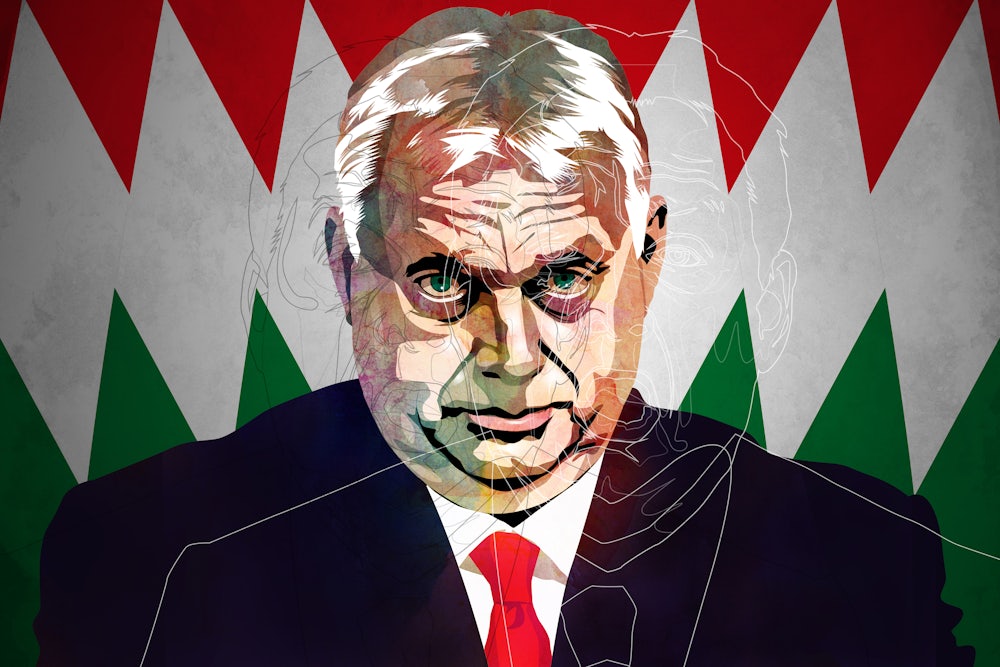When Fox News host Tucker Carlson visited Hungary in August 2021, he received a state welcome. Hungarian public TV presented him as the most influential conservative thinker in the United States. In his speech at a political summer festival, the TV star explained that in the United States, liberals were forcing intolerance on people: “It is illiberalism. It is the opposite of liberalism. It is a totalitarian idea that everyone behaves the same, everyone reads from the same catechism, from the same list of slogans, and that everyone obeys. That is the opposite of enlightenment liberalism, which forms the basis of my politics and my worldview.” Carlson’s enthusiastic audience generously overlooked his confusion, since Prime Minister Viktor Orbán, his hero, has been openly building an “illiberal state” in Hungary, something he believes is the most authentic form of democracy.
While both men have found common ground in the unrelenting culture war against liberals, Carlson may have been unaware of how the celebrated “Hungarian model”—in fact, illiberalism—was working in practice.
I know that Americans are concerned about their democracy. Concerned—but perhaps confused about how democracy is destroyed, step by step. Well, I am Hungarian, and I can tell you what can happen.
When Fidesz, the Federation of Young Democrats, was established in 1988, it was a fresh, dynamic, and politically conscious youth group. It defined itself as a radical, liberal, and alternative organization and branded itself as the ardent guardian of freedom, rights, and the rule of law. When I met Viktor Orbán and joined Fidesz to fight the autocratic communist system, I found him a thoughtful and ambitious person with great strategic skills. At the time, Fidesz presented itself as a party of the center, distinguishing itself from the deeply polarized traditional political elites, who had characterized Hungary’s pre–World War II past, and who were going through a revival in the tumultuous years after the Cold War ended. Our generation gained freedom in our youth denied to our parents and grandparents. We could start with a clean slate, and for us the sky was the limit.
Strategic and personal differences emerged in Fidesz when we entered Parliament as a result of the first free elections in 1990. More radical members, such as Orbán, wanted the party to move to the right, hoping that there were more political opportunities than in the center. After several years of tough debates, the party split, and the centrist liberals, who defended Fidesz’s original ambitions, left the party, including me. Without strong internal critics, Orbán pulled the party to the right by the end of the 1990s, securing the support of anti-communist conservative politicians and the Roman Catholic Church.
In 1998, when at the age of 35 he became the youngest freely elected prime minister in Hungary’s history, at the helm of a right-wing coalition government, Orbán’s position as party chief became unquestionable. Despite a successful period, Orbán’s party lost the parliamentary election in 2002. Party veterans were deliberating how to keep the charismatic Orbán on board but replace him as leader, an endeavor that ultimately failed. Orbán’s frustration echoed that of the old conservative political elite, who felt that the defeat was unjust and supported his adoption of a highly divisive form of politics.
After also losing the subsequent election in 2006, Orbán sidelined his more moderate colleagues. When the socialist-led government after the 2006 election made a political mistake—a speech of the prime minister leaked, in which he admitted that the party lied during the campaign about the state of the economy—Orbán launched an aggressive political attack to remove it from power. He polarized public discourse, portraying the left-liberal government coalition as the adversary of the nation and agitated to constantly mobilize the streets. While his efforts to remove the ruling coalition did not succeed, Orbán forced the government on the defensive. The several-year-long political cold war culminated in the economic crisis in 2008, which paved the way for Orbán’s landslide election victory two years later. In 2010, with nearly 53 percent of the popular vote, Fidesz ended up with over two-thirds of parliamentary seats in the unicameral Parliament. This overwhelming majority allowed Fidesz to alter the constitution.
Shortly before these life-changing elections, Orbán gave a speech to his party elite saying that “it was enough to win just once, but decisively—that was the way.” He explained to them that political power has three resources: votes, ideology, and money, which are to be nurtured in order to reproduce power.
I returned to Hungarian politics in 2012 and became a member of Parliament two years later, representing a new centrist-liberal party. I witnessed firsthand how Orbán took revenge for his previous defeats and developed the perfect playbook of votes, ideology, and money to change Hungary’s democracy into an illiberal system, to ensure that he would win the elections again and again.
Votes
With a majority hardly imaginable in any Western country, Fidesz dominated the Hungarian National Assembly and started to change the system with a cunning glee. Putting Viktor Orbán’s metaphor borrowed from sports into practice, the government dominated the state and incapacitated its political rivals with an all-out, across-the-board attack.
The election law was modified, leading to massive gerrymandering and providing the winning party with extra seats after the victories in individual electoral districts. These changes resulted in a completely distorted system. In the 2014 election, Fidesz needed only 45 percent of popular votes to win 67 percent of parliamentary seats, while other parties gaining 55 percent of votes got only 33 percent of the seats. The will of Hungarians was in no way represented by the outcome of the elections any longer.
The parliamentary supermajority enabled Orbán to place his loyal friends in each and every state institution. Orbán’s cronies were parachuted into six-to-12-year terms in the Constitutional Court, the National Media Authority, the Competition Authority, the State Audit Office, and the Public Prosecutor’s Office. This takeover effectively ensured that no misbehavior by the government would be called to account. Orbán’s nominee for president of the republic, for example, said at his parliamentary hearing in 2010: “I will not be an obstacle to the government’s drive to legislate; rather, I will be a motor. I do not wish to be a counterweight, rather I shall strive for balance.”
Within a few short years, the system of checks and balances that would protect the integrity of the democratic system was gone. Through very deliberate choices, the governing party captured the once-independent state institutions, which became the pillars of the one-party regime. Hungary reached a level of concentration of power that Europe had not seen for decades.
Without any consultation with political parties (there were four other parties in Parliament in 2011) or civil society organizations, Fidesz changed the constitution. The new Fundamental Law, the foundation of the legal system, was drafted so hastily that the ink wasn’t even dry on the paper. Eight months after the new Fundamental Law was passed, a set of related laws was created named “transitional provisions.” One law robbed the Constitutional Court of the power to express an opinion in budgetary matters; another stipulated that the National Assembly alone can recognize a religious community eligible for state funding; a third laid down that, during election campaign periods, political parties could advertise only in public-service media, not in commercial media. These laws were an open breach of the principle of separation of powers, freedom of religion, and fair competition of political parties.
When these strikingly unconstitutional laws were ruled out even by the Fidesz-loyal Constitutional Court, the ruling party simply amended the constitution and enshrined all the problematic elements into the Fundamental Law. Later, another amendment redefined what was considered to be public resources, providing the government the opportunity to hide public funds from parliamentary scrutiny. In 10 years, the Fundamental Law was amended nine times, allowing the governing party to abuse power while appearing to be following the law.
Ideology
Ever since Fidesz moved to the right in the late 1990s, the party has been flexible enough to adapt its ideological profile to its political aims. The originally centrist-liberal party successfully rebranded itself as a right-wing party. Then, after his electoral defeat in 2002, Orbán started to use populist-nationalist narratives, ultimately polarizing the society according to the interests of a revenge-hungry party.
After 2010, Orbán wanted stronger media control to trumpet the governing party’s political messages, targeted carefully to well-researched groups within the population. His government quickly dominated the state-funded public media by appointing chief editors loyal to the party. Generous state bank loans helped the party’s cronies to acquire significant privately owned media, such as regional newspapers, news radio, the largest online portals, and private television stations. The efforts to control the media culminated in a hugely surprising move in 2018, when over 450 Fidesz-friendly private media outlets merged into one giant media holding company in a single day. The government issued a decree that classified these transactions as being of “national strategic importance,” thus ruling out any inquiry vis-à-vis competition law.
The sizable National Communications Office, which operates within the prime minister’s office and is led by a government minister, was charged with guiding this private media holding company and the public media through weekly informal briefings and key talking points. Such a concentration of loyal media enabled the governing party to run very efficient political campaigns and influence public opinion through its never-ending aggressive/offensive communication, which the rest of the media could not counter. Orbán’s political rivals were effectively spoiled by overwhelming smear campaigns and conspiracy theories, and pro-Fidesz operations showed citizens that there were no other relevant political forces in Hungary but the ruling party.
The incredible efficiency of this propaganda machinery was boldly demonstrated in 2015 when the migration flow from the Middle East and Africa challenged Europe with hundreds of thousands of migrants within months, many of whom passed through Hungary. At the time, Fidesz had been working with Arthur Finkelstein, a former campaign adviser of Senator Jesse Helms, and his colleague George E. Birnbaum. Fidesz learned from them how to build a campaign on people’s existential fears and how to link these fears to liberal opponents, pinning them in a tight corner and making it impossible for them to defend themselves against the accusations.
Orbán’s anti-migrant campaign was so successful in tainting his Hungarian opponents, European critics, and even American businessman George Soros that he easily won the election in 2018, his third victory in a row. In 2019, Birnbaum proudly told a Swiss newspaper that Orbán’s anti-migrant, anti-liberal, anti-Soros campaign was their greatest-ever achievement in building archenemies.
Money
Orbán’s political power in the National Assembly was enough to redraw the constitution and to install people in key institutions, which made him stronger. However, buying up commercial media would not have been possible without vast financial resources. Hungary is a European country of 10 million people. (Hungary’s GDP per capita is slightly more than half of America’s.) The country is scarce in capital; its business elite class is narrow and insignificant in a European context. In the last decade, however, Orbán built up a new business elite of cronies close to him, using state infrastructure developments as the main source of funding. By manipulating public procurements, the government could craftily redirect billions of U.S. dollars in European development funds to a small group of selected companies. The European Union was not able to prevent this.
Enriched by state regulations and sophisticated rent-seeking techniques, a coterie of businessmen grew out from almost nowhere. One of them, Orbán’s childhood friend, Lőrinc Mészáros, a gas fitter and former village mayor, accumulated a marvelous fortune within a couple of years. In 10 years, he increased his revenue from half a million to over $180 million, which landed him on the Forbes billionaires list in 2019. He owns land, a construction company, stake in a bank, the majority of a power station, an energy service provider company, a castle and a hunting lodge, hotel chains, a soccer team, and one of the biggest media companies. When he was questioned about how he could achieve such remarkable success faster than Meta co-founder Mark Zuckerberg, he smugly replied that he might be smarter than him.
The neophyte Hungarian business elite are feeding Fidesz-loyal media with hefty advertisements, sometimes providing 70 to 80 percent of their financing. What is more, Fidesz’s cronies and members of the party’s cultural elite are placed on boards of state-funded cultural and academic institutions to represent the governing party’s ideological expectations for cultural products and academic output.
What is the ideology Fidesz is proclaiming with such an effort? Whereas Orbán propagates a Christian-conservative culture war, ultimately he is building an autocratic state. In 2014, Orbán announced that his regime being built in Hungary did not follow liberal ideas of social organization. It was based not on a set of individuals, but on a national community, which ultimately was an “illiberal state.” He gave a long justification for why it was correct to enact retroactive legislation, and to intervene in the functioning of the courts, which had previously been understood as breaching the basic principles of democracy.
Orbán’s illiberalism was a direct consequence of his 2002 defeat, after which he introduced morally stigmatizing language, casting his political rivals as an existential threat and presenting himself as the savior of the nation. By mobilizing even the extreme right groups, he successfully built a political tribe, and when he finally returned to power, he mobilized law and state resources to humiliate civil society, and to demonize, ridicule, and ultimately cripple his opposition. One of Orbán’s former conservative ministers admitted recently that they followed him in this fight in order to “avoid the return of the devil”—the communists.
Many former supporters of Orbán have turned away from him over the years. His confrontational and hate-mongering politics, his embrace of Russia and China, and his continual infringements of European legal norms alienated many former followers. To maintain his popular base, Orbán’s party organized conspiracy theory campaigns to mobilize more frustrated and uninformed voters. When he was practically kicked out of the large European People’s Party (EPP) family of conservative and Christian-democratic parties in 2021, Orbán was forced to forge alliances with openly far-right political forces. He became the hero of French far-right politicians Marine Le Pen and Éric Zemmour, as well as Italy’s Matteo Salvini and Tucker Carlson, who all idealize Orbán because he has put his anti-democratic ideals into practice.
It is timely to ask if Hungary is still a democracy or not. Can its people peacefully change their leaders, if they want to? Is a peaceful handover of power possible? Could another government lead the country effectively?
Democracies depend on an institutional framework and on a cultural background: the acceptance of democratic norms. In Hungary, the institutional framework is formally still there, but Orbán’s government gave up on democratic norms and used government power to capture the institutions, which are not fulfilling their roles as checks and balances. In political fights, half of the political elite do not accept that sometimes they can’t get their way. It is highly questionable that democratic institutions and elections are still meaningful in my country.
Still, the level of freedom has remained much higher in Hungary than in a classic dictatorship. There is no open violence, journalists are not in prison, and, as long as there are elections, the opposition always retains some chance to win and bring about a change of power.
Elections are a risk for Orbán. A united opposition, a unique cooperation formed this time, can leverage the majoritarian election system, but it must amass significantly more votes than Fidesz. An opposition victory is a threat that Orbán’s party cannot afford, because, after an electoral defeat, Fidesz’s leaders could not simply walk away from being called to account for abusing state power. For Orbán, there is no simple way back to opposition.
This is why it is so important for him to ally with America’s Conservative Political Action Conference (CPAC), which supports his illiberal cause and plans to bring its radical right-wing activists to Budapest for its first-ever meeting in Europe. Orbán has become isolated from moderate forces on the continent, and there is no mainstream party leader who would support him. Orbán’s autocratic tendencies won’t become invisible by his current stand with the European Union and NATO’s sanctions against Russia. After Orbán’s courting of Vladimir Putin for years, his balancing dance between Russia and the West has become difficult. But next to Trump, Orbán can still be seen by his voters as a world leader.
The illiberal Hungarian experiment will continue after Orbán’s latest landslide victory on April 3*. Political language is radicalized, elite polarization is toxic, political tribes are firm, the distribution of state resources is perverse, and democratic institutions are subverted. Orbán, the warrior of illiberalism, will continue his fight on the international scene; for him, there is no way back. As Europe and the Western alliance is pulling together as a result of Putin’s war, they will likely face a more hostile Orbán, who is ready to use his newly confirmed power to play a role in shaping a new status quo. At the same time, Hungary will fall deeper into Orbán’s autocracy. Illiberalism is dangerous. Democrats in Europe and the United States should define in what system they want to live and prevent illiberalism before it is too late.
*This article has been updated from the version appearing in the May 2022 print issue of The New Republic.




